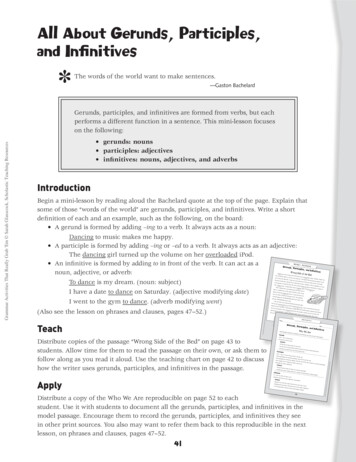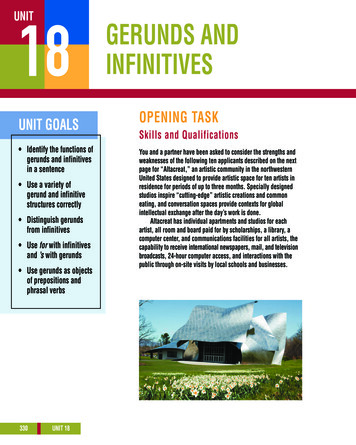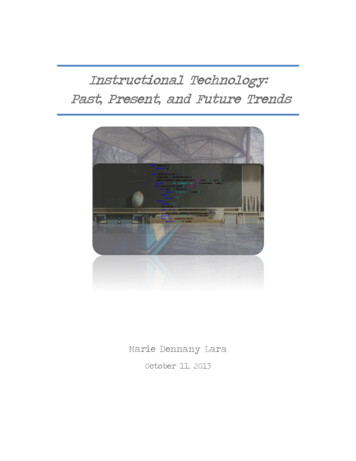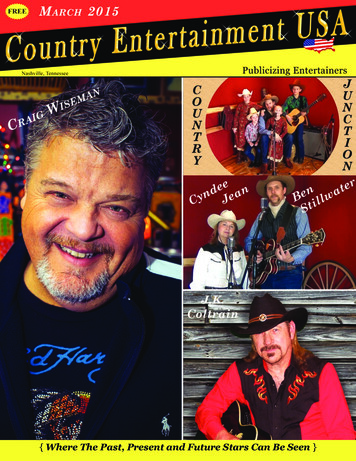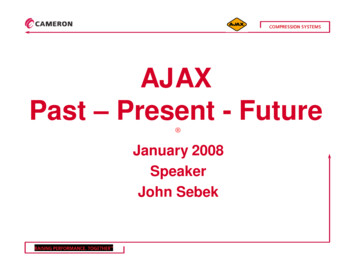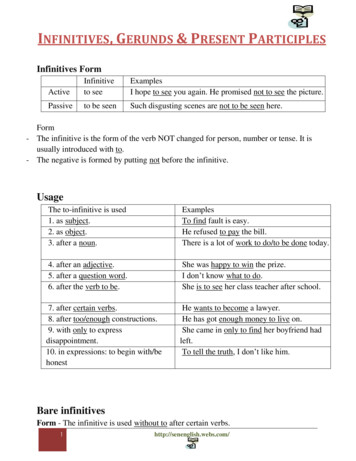
Transcription
INFINITIVES, GERUNDS & PRESENT PARTICIPLESInfinitives FormActiveInfinitiveto seeExamplesI hope to see you again. He promised not to see the picture.Passiveto be seenSuch disgusting scenes are not to be seen here.Form- The infinitive is the form of the verb NOT changed for person, number or tense. It isusually introduced with to.- The negative is formed by putting not before the infinitive.UsageThe to-infinitive is used1. as subject.2. as object.3. after a noun.ExamplesTo find fault is easy.He refused to pay the bill.There is a lot of work to do/to be done today.4. after an adjective.5. after a question word.6. after the verb to be.She was happy to win the prize.I don’t know what to do.She is to see her class teacher after school.7. after certain verbs.8. after too/enough constructions.9. with only to expressdisappointment.10. in expressions: to begin with/behonestHe wants to become a lawyer.He has got enough money to live on.She came in only to find her boyfriend hadleft.To tell the truth, I don’t like him.Bare infinitivesForm - The infinitive is used without to after certain verbs.1http://senenglish.webs.com/
UsageThe bare infinitive is used1. after the verbs do, does and did.2. after modal verbs-can,could,should,will ExamplesHe did not write down the answer.You can leave now if you want.3. after perception verbs-see,hear,smell,feel.I saw Tom run out of the bank.4. after let and make.(passive to-infinitive)They made him pay for the damage.He was made to pay for the damage.5. after would rather, had better.I would rather not go out tonight.I had better stay at home.We could do nothing except/ but wait.6. after except,cannot but, can do nothing but.Gerunds FormActivePassiveGerundsseeingbeing seenExamplesSeeing is not believing.She does not mind being seen to work in the restaurant.Form- The gerund is a verb ending in - ing. It acts as a noun.- The negative is formed by adding not before the gerund.UsageThe gerund is used1. as a noun – subject/ object.ExamplesReading is fun. Your car needs washing.2. after prepositions.3. after certain verbs: spend, waste, avoid The child is fond of playing chess.He spends his free time digging thegarden.2http://senenglish.webs.com/
4. after possessive adjectives/ noun ’s.Do you mind my joining you on the trip?5. after go verb–ing (activities)Let’s go shopping/ swimming/ camping.6. after be busy/ worth.He is busy doing exercise. It is worthseeing.I look forward to seeing you soon.I am not used to going to bed late.He objected to pulling down the oldhouse.7. after certain phrases:look forward to/ devoted to/ objected to/consent to/ used to/ accustomed to 8. after certain expressions:It’s no use/good There’s no/no pointin.It’s a waste of time/money have difficulty(in) /can’t helpas/ like/ thanIt is no use crying over spilt milk.There is no joking about this matter.It is a waste of time playing onlinegames.I can’t help laughing.It was like being in the desert - so quiet!Verb to-infinitive or –ing? Usage1. The to-infinitive and the gerund are used after certain verbs.The to-infinitive is used after certainThe gerund is used after certain verbs:verbs:afford, agree, appear, ask, attempt,admit, anticipate, appreciate, avoid,decide, expect, fail, hope, learn, manage,consider, delay, discuss, enjoy, escape,offer, plan, prepare, pretend, promise,excuse, fancy, finish, forgive, imagine,refuse, seem, threaten, want, wish involve, keep mention, mind, miss, objectto, practice, prevent, postpone, quit, recall,e.g. He offered to help us.report, resent, resist, risk, save, stand,suggest, tolerate e.g. We should avoid making mistakes.2. Either the to-infinitive or gerund can be used after certain verbs with no differencein meaning.3http://senenglish.webs.com/
advise, allow, begin, bother, can’t bear, continue, encourage, hate, intend, like, love,permit,prefer, propose, recommend, require, start .e.g. We started to do/ doing our summer homework.3. Verbs taking to-infinitives or gerunds have a change in meaning.Verbs taking to-infinitivesVerbs taking gerunds1. forget: forget to do sth1. forget: forget a past evente.g. I’m sorry, I forgot to lock the car.e.g. We’ll never forget visiting Paris.2. remember: remember to do sth2. remember: recall a past evente.g. Remember to read the instructions.e.g. I don’t remember meeting Ali before.3. mean: intend to3. mean: involvee.g. He means to move to New York.e.g. Love means sharing.4. try: do one’s best; attempte.g. She tried hard to cope with her job.4. try: do sth as an experimente.g. Try adding more sauce to your pasta.5. stop: pause temporarilye.g. He stopped to buy a gift on his way.5. stop: finish; ceasee.g. Stop talking to each other, please!6. regret: be sorry to6. regret: feel sorry for what we’ve donee.g. I regret to tell you that you’ve failed. e.g. I regret telling lies.7. be sorry: feel sade.g. I’m sorry to hear the bad news.7. be sorry for: apologisee.g. I’m sorry for being late.8. hate: hate what one is about to doe.g. I hate to interrupt, but I must do so.8. hate: feel sorry for what one is doinge.g. I hate making you feel uncomfortable.9. be afraid: too frightened to do sthe.g. I’m afraid to walk over that bridge.9. be afraid of: afraid that sth may happene.g. She is afraid of being too fat.4http://senenglish.webs.com/
10. would prefer/love/like: specificpreferencee.g. I ‘d prefer/like to see the manager.10. prefer/love/like: in generale.g. I prefer/love watching TV.11. want/need: wish/ have toe.g. I want/need to find a better job.11. want/ need: sth needs to be donee.g. Your dress wants/needs cleaning.12. go: action12. go: for activitiese.g. He went to see his sick grandparents. e.g. We often go shopping/ hiking.Present ParticiplesFormationThe present participle is formed by adding the ending "--ing" to the infinitive(dropping any silent "e" at the end of the infinitive):to sing -- singingto take -- takingto bake -- bakingto be -- beingto have -- havingA. The present participle may often function as an adjective:That's an interesting book.That tree is a weeping willow.B. The present participle can be used as a noun denoting an activity (this form is alsocalled a gerund):Swimming is good exercise.Traveling is fun.C. The present participle can indicate an action that is taking place, although it5http://senenglish.webs.com/
cannot stand by itself as a verb. In these cases it generally modifies a noun (orpronoun), an adverb, or a past participle:Thinking myself lost, I gave up all hope.Washing clothes is not my idea of a job.Looking ahead is important.D. The present participle may be used with "while" or "by" to express an ideaof simultaneity ("while") or causality ("by") :He finished dinner while watching television.By using a dictionary he could find all the words.While speaking on the phone, she doodled.By calling the police you saved my life!E. The present participle of the auxiliary "have" may be used with the past participleto describe a past condition resulting in another action:Having spent all his money, he returned home.Having told herself that she would be too late, she accelerated.Q. Replace the Gerunds with Infinitives and Vice versa / UseUse Gerunds / Infinitives.1.David grew up considering blindness no tragedy.Ans. Day grew up to consider blindness no tragedy.2.I found what I loved to do early in life.Ans. I found what I loved doing early in life.3.But something slowly began to dawn on me.Ans. But something slowly began dawning on me.4.The only way to do great work is to love what you do.Ans. The only way to do great work is by loving what you do.5.My father refused to use the jeep to commute to the office.Ans. My father refused using the jeep to commute to the office.6.My mother began developing a cataract in her eyes when I was small.Ans. My mother began to develop a cataract in her eyes when I was small.6http://senenglish.webs.com/
16.Ans.17.Ans.18.Ans.19.Ans.7.Other than reading out the newspaper to my mother, I had no clue about howI could be a part of the action.Ans. Other than to read out the newspaper to my mother, I had no clue about Icould be a part of the action.8.A vision with which I continue to see the world.Ans. A vision with which I continue seeing the world.9.There were a few things that my mother wanted me to help out with.Ans. There were a few things that my mother wanted me helping out with.10.Making omlettes and rolling out chappatis became my special duties.Ans. To make omlettes and to roll out chappatis became my special duties.11.In India there are always other people to do all that for you.Ans. In India there are always other people doing all that for you.12.My parents preferred to patronize just one store.Ans. My parents preferred patronizing just one store.13.I tried arguing.Ans. I tried to argue.14.It's harder and harder to find full-time help these days.Ans. It's harder and harder finding full-time help these days.15.He loves to laugh.Ans. He loves laughing.Freed now from the burden of bringing up children, my father has dispensed with hisrigid, cold facade.Freed now from the burden to bring up children, my father has dispensed with hisrigid, cold facade.As a symbol of the bush, clean air, freedom, getting out and doing things, it couldquite possibly inspire the apathetic residents.As a symbol of the bush, clean air, freedom, to get out and to do things, it couldquite possibly inspire the apathetic residents.The two council continued to work at unflagging speed.The town council continued working at unflagging speed.With great difficulty she managed to have an audience with himWith great difficulty she managed in having an audience with him.7http://senenglish.webs.com/
games. I can’t help laughing. It was like being in the desert - so quiet! Verb to-infinitive or –ing? Usage 1. The to-infinitive and the gerund are used after certain verbs. The to-infinitive is used after certain verbs: The gerund is used after certain verbs: afford, agree, appear, ask, attempt, decide, expect, fail, hope, learn, manage,
